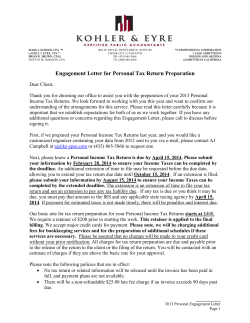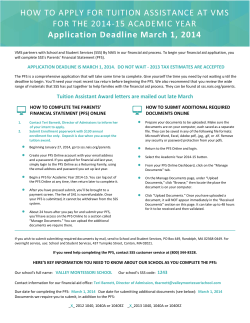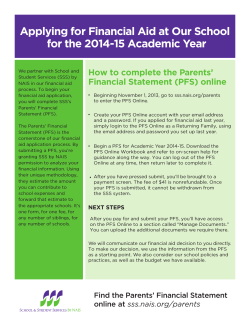
How To Make Your Financial CPA Strong
How To Make Your Financial Plan CPA Strong Tax Relief and Investment Incentives for Your Small Business Why Work With a CPA Personal Financial Specialist? All financial planners are not created equal. A Personal Financial Specialist is more than a financial planner – he or she is a CPA armed with the combination of extensive tax expertise and comprehensive knowledge of financial planning. This knowledge is critical to obtaining the most valuable, objective advice possible. All areas of personal financial planning – including estate, retirement, investments and insurance – have tax implications, and the PFS professional has the experience, ethics and expertise to get the job done right. The road to financial security is rarely smooth and easy. Creating and following long-term financial and tax planning strategies for your family or small business can be daunting, even during stable and prosperous times. In a political, economic and tax environment that is in constant flux, staying on top of your complex financial life is even more challenging. It’s also more important. As a trusted advisor, a CPA (Certified Public Accountant) is in a unique position to provide objective recommendations so you can make informed decisions. CPAs who also hold the PFS credential have the added expertise in all areas of financial planning – helping you see the big picture and ensuring that all of the bases are covered. SM Being a CPA first and foremost, they are licensed by your state and adhere to a strict professional code of conduct. Combined with additional education, testing and time in the field in order to earn their PFS credential, this ensures that you can count on competence, objectivity and the highest standard of integrity for your most important financial decisions. Benefiting From the Services of a CPA Personal Financial Specialist CPAs have ranked among the most valued and respected professionals for more than 125 years, and are second only to physicians in terms of consumer trust and confidence. CPA Personal Financial Specialists provide a full range of services that can help you attain financial security and success. Although they do not offer every service discussed here, they offer their own specialized combination and will work with other professionals to complement those services – customizing their offering to meet your unique needs and specific goals. 2 Meeting Your Personal Financial Goals Whether you’re thinking of purchasing a new home, saving for retirement, eliminating debt or funding a college education, a CPA Personal Financial Specialist can help you achieve financial milestones. Your CPA/PFS can: •Devise practical savings and investment strategies that help you navigate the complexities of your financial life, capitalize on your fiscal strengths and address your financial weaknesses •Ensure your cash flow is flexible enough to accommodate the good, the bad and the unexpected in your personal and professional lives •Help monitor and revise your financial plan as necessary so you can create a fluid action plan that meets your goals as well as your lifestyle Income Tax Planning and Preparation A continuing education requirement keeps CPA Personal Financial Specialists up-to-date about constantly changing tax laws so they can provide prudent, year-round tax planning counsel. Your CPA/PFS can: • Design strategies you can follow throughout the year to reduce your taxes • Clarify the impact of the latest tax laws, legislation and IRS rules on your tax liability • Identify the long- and short-term tax consequences of your spending, investment and other financial decisions, and advise you on the steps you can take to reduce your future tax liability Estate Planning For most of us, planning for the distribution of our financial resources and personal property can be a difficult and emotionally charged issue. However, with a CPA Personal Financial Specialist’s professional and comprehensive approach to estate planning, you can be assured that your wishes will be honored. Your CPA/PFS can: • Review wills, trusts, retirement plans and other estate-planning documents and ensure that they remain up-to-date • Develop a strategy that fulfills your goals while preserving assets for the next generation, reducing estate-tax liability and providing for sufficient liquidity • Explain different methods of property transfers, estate-tax rules, the impact of the most current estate-planning legislation and possible future changes in rules and regulations • Collaborate with other team members – attorneys, investment advisors, appraisers and insurance brokers, among others – to ensure that every issue is properly addressed by the appropriate expert The CPA/PFS credential holder The Personal Financial Specialist (PFS) credential is the only financial planning credential that requires having a CPA license first. The AICPA grants the PFS only to those CPAs who have had specialized financial planning education and thousands of hours of real-world experience: • 3,000 hours of business experience in financial planning • 80 hours of financial planning education • Passing of a comprehensive financial planning exam The combination of a CPA and the PFS credential signifies a highly qualified professional prepared to discuss all aspects of financial planning – including estate, retirement, investment and education planning – along with their potential tax implications. Together, the ethics of the CPA and the expertise of the PFS provide a strong foundation for valuable, objective advice. 3 Retirement Planning It is never too late to plan for retirement; however, the sooner planning starts, the more financially prepared you are likely to feel when the time arrives. Specialized guidance and support from a CPA Personal Financial Specialist can help you develop a plan that delivers a secure and comfortable retirement and peace of mind during your pre-retirement years. Your CPA/PFS can: • Review expenses that will be, or are likely to be, incurred during your retirement and create a plan to eliminate any shortfall between income and expenses • Identify the primary sources of retirement income that you have or should have and calculate the savings required for you to retire at a specific age and achieve your desired lifestyle • Create strategies for preserving and growing retirement account balances and distribution amounts • Recommend a diverse range of tax-efficient financial tools – IRAs, 401(k)s, investments and tax-sheltered opportunities – that are best suited to your age and retirement time frame Investment Planning Creating and growing the resources needed to reach your financial and lifestyle goals starts with a well-crafted investment strategy. A qualified* CPA’s expert insight provides the foundation on which you can build a sound investment plan. Your CPA/PFS can: • Evaluate your assets, liabilities and cash flow, and determine how you can best meet your current financial needs • Explain the advantages and disadvantages of the full range of investment options, from annuities, Treasury bills and insured certificates of deposit to life insurance, stocks and mutual funds • Develop a plan that meets your short- and long-term financial goals, is consistent with your risk tolerance and has the potential to generate optimum returns during the time you have to invest • Provide strategies for managing a sudden financial setback or windfall, including the best ways to use, manage and protect your resources * Only professionals who are registered with the SEC or with their state securities regulator to provide investment advice are eligible to do so. Check with your CPA to be sure he/she is an “investment adviser” under federal and/or state securities regulations. 4 Education Planning You and your family can look to the future far more positively when you have a well-planned strategy for education costs. With a plan that features a CPA Personal Financial Specialist’s tax-savvy investment advice and guidance, you can realize your education funding goals and reap the benefits they deliver. Your CPA/PFS can: • Create a timely, diverse college investment strategy designed around your financial resources, child’s age, risk tolerance and projected educational costs • Explain tax credits and deductions that can defray education costs, and the tax implications of education-related investment and savings decisions • Recommend ways for the student to become involved in the planning process and contribute to the education fund • Keep your plan updated to reflect changes in your employment situation, investment options, savings plans, financial-aid requirements and tax laws 5 Strategic Business Planning and Consulting Business owners have a different set of needs than individuals and families. In many cases, however, a small business owner’s personal tax issues are intertwined and directly connected with those of their business. CPA Personal Financial Specialists act as independent advisors who can work with business owners to help them coordinate business and personal financial goals. Your CPA/PFS can: • Create a realistic business plan, and help you select an organizational structure that meets your needs • Help identify financing, and negotiate financing terms and conditions • Advise on employee benefits, executive compensation, retirement plans, insurance and other areas Risk management Planning Risk is a part of life. It’s how you deal with it that counts. While most of us immediately think of managing risk in terms of insurance, it’s important to recognize the need to protect yourself in a full range of areas. This includes both unforeseen events close to home, and the fallout from financial and market conditions that might seem far away. Your CPA/PFS can: • Point out areas of your plan that would be most susceptible to risk • Describe the types of risks in your investment portfolio • Suggest ways to manage risks – avoiding, reducing or sharing • Help quantify the impact of loss of income or assets The point isn’t to be afraid; it’s to have a plan in place that offers as much protection as you need to weather a storm. And who better to talk about risk in a clear, levelheaded way than an objective CPA? 6 Meeting With Your CPA Personal Financial Specialist Creating a relationship with your CPA/PFS is similar to establishing a trusting relationship with other professionals on whom you rely for sound, objective advice, such as a doctor or attorney. You will want to find a CPA financial planner who can best protect your interests, listen to and address your concerns and, equally important, make you feel comfortable and valued. It all begins with your first meeting. Here is what you can expect: • Scope of Services. When you schedule an appointment, he or she will ask you to explain the type of services you need – your scope of services, also called an engagement. Examples include tax preparation, financial planning and investment management. • Required Paperwork. Your CPA/PFS will ask that you bring specific records and other documents with you to the meeting. The type of documents will depend on the engagement. Providing the proper paperwork will allow your CPA/PFS to better understand your situation, and ensure a productive meeting. • Cost of Services. Once you have met and discussed the engagement, your CPA/PFS will provide you with an engagement letter summarizing the services and the scope of work to be performed. It also will discuss the terms of payment depending on the type of engagement. A CPA who also is a Personal Financial Specialist is in an ideal position to understand your current financial position, and specially trained to help you prepare for the future as well – providing objective, independent advice so you can make informed decisions. As you start thinking about putting together a plan for your family or small business, think about turning to the person who can work with you to coordinate your total financial situation. And help you craft a plan that’s CPA Strong. What are a CPA’s qualifications? CPAs’ qualifications make them the trusted professionals who are best prepared to meet all of your personal or business financial and tax planning needs. CPAs must: • Hold an undergraduate degree • Complete, generally, up to 150 hours of career-focused education • Pass a comprehensive, rigorous four-section, qualifying examination • Meet strict state-licensing guidelines • Fulfill generally 40 hours of continuing professional education each year • Adhere to a code of professional ethics A CPA Personal Financial Specialist builds on this strong foundation with literally thousands of additional hours of training and experience, and he or she must pass a rigorous exam before earning this credential. 7 Let’s talk about creating a financial plan that’s CPA Strong. Copyright © 2011 American Institute of CPAs 11457B-302 SECURITIES OFFERED THROUGH QUESTAR CAPITAL CORPORATION (QCC). Member FINRA/SIPC. Advisory Services offered through Questar Asset Management (QAM). A Registered Investment Advisor. JM Stanley & Associates, LLC is independent of QCC and QAM. QCC and QAM do not offer tax or legal advice.
© Copyright 2025




















